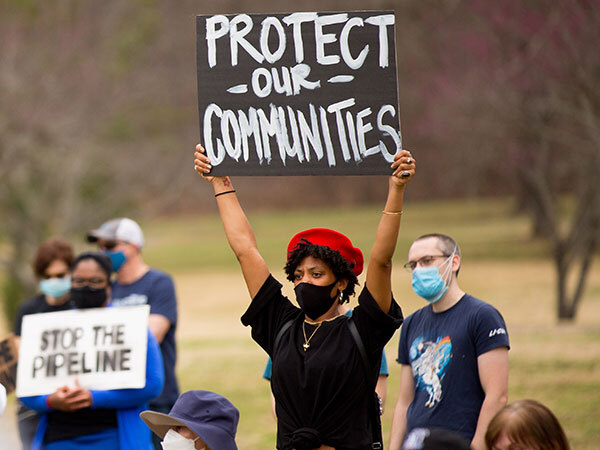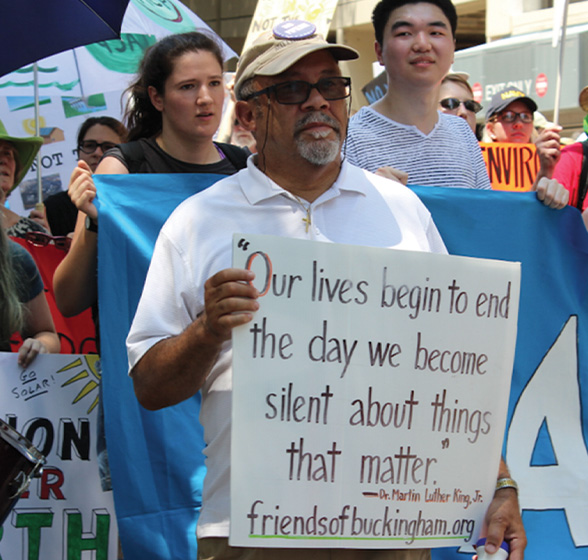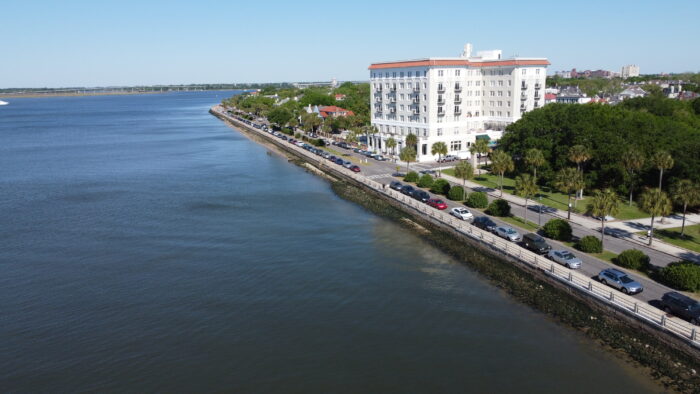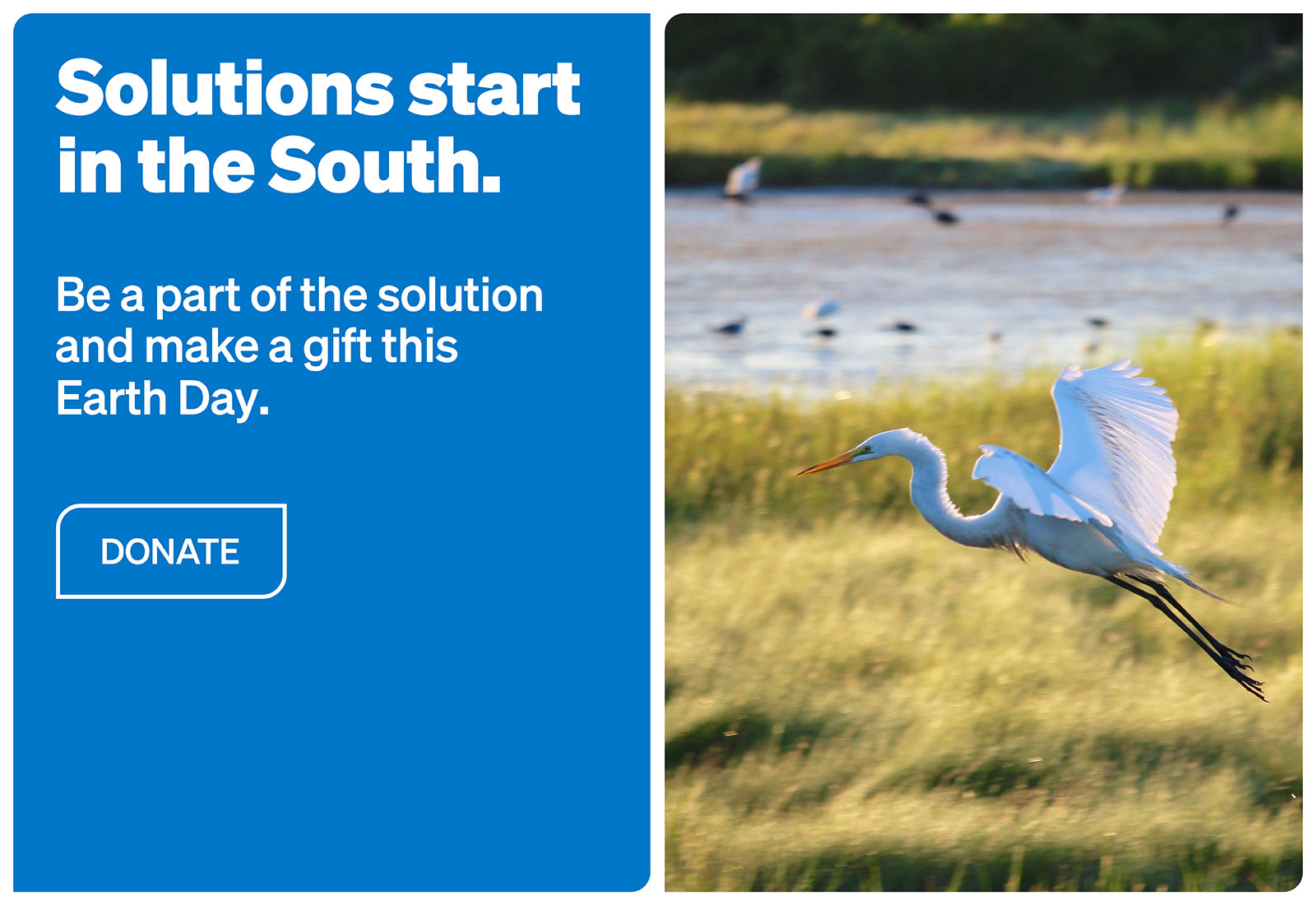Solutions start in the South
2022 results and priorities for 2023
The Southern Environmental Law Center is built to take on the great environmental challenges of our time.
As the South experiences extreme heat and increased flooding, there is no question we are at a critical moment for our environmental future. SELC, alongside hundreds of partners, has the opportunity to protect our region’s remarkable communities and natural resources and to help turn the tide on climate change. And we know that we are stronger when we stand together in this fight.
Rooted in the South, we focus on solutions, using strong legal and policy expertise, strategic vision, and pragmatic problem solving in all three branches and at all levels of government.
With our commitment to place-based action, SELC is building on 37 years of success in six Southern states and driving results that resonate across the nation. That’s why we say, “Solutions start in the South.”
Thank you for supporting this important work.
Expanding clean energy to take on climate change
SELC is making the case for the expansion of solar across the South—in front of utility regulators, at state legislatures, and in the courtroom. In early 2015, with barely 1,000 megawatts of solar capacity in our region, we set out to expand that to 7,000 megawatts by 2018. We exceeded our goal, securing 11,000 megawatts of solar installed or committed. We are again ahead of schedule, with 23,000 megawatts of solar power operational or in the pipeline. SELC will keep fighting to expand access to rooftop and community solar programs in each of our states.
Virginia is leading our states with strong laws on the books to reduce carbon pollution. The 2020 Clean Economy Act and related legislation put the Commonwealth on a cost-effective path to a zero-carbon electricity grid by 2050, in part by joining a regional carbon cap and trade market. Recent clean cars legislation commits to substantially expanding the availability of low-emission and electric vehicles while eliminating millions of tons of emissions in the coming decades. With a change in state leadership, we are now defending these laws against attacks on multiple fronts.

We continue to push for North Carolina to follow Virginia by charting the most efficient path to implement legislation enacting a carbon reduction program that will achieve Gov. Cooper’s goal of reaching net zero emissions for the electricity sector by 2050.
SELC and our partners have significant opportunities to push Georgia Power to replace its retiring coal units with more renewable energy and energy efficiency programs. In 2019, we laid the groundwork to ensure fair returns for up to 5,000 Georgia Power customers with rooftop solar installations. We are now advocating in front of utility regulators for the removal of that cap and other policies that make solar more affordable and accessible.
We secured a string of historic victories in 2020 and 2021 helping put South Carolina’s energy planning on a path away from fossil fuel power and toward clean energy alternatives. After a series of recent negative decisions from utility regulators, we are defending the state’s gains and pressing for speedy retirement of coal-fired power plants to ensure coal is not simply replaced by another fossil fuel.
Environmental Justice is a top SELC priority

Communities of color and low-wealth communities often face disproportionate impacts from climate change and other environmental threats. SELC works hard to be a powerful partner and advocate ensuring that all communities in our region have clean air, clean water, and a healthy environment.
In suburban Birmingham, two coking plants sit two miles apart in majority Black neighborhoods. Both have terrible records of air pollution violations, which cause a variety of health issues in the fence-line communities nearby. Last year, the county’s health department refused to reissue the air permit for Bluestone Coke, a longtime violator of the Clean Air Act. Bluestone has since shut down operations, and the plant will not be able to reopen without extensive reconstruction. SELC, on behalf of GASP, has intervened in an enforcement case against the plant, and we are ensuring that the operators will be adequately penalized financially and required to implement extensive air monitoring to protect the community, if the plant is allowed to reopen.
SELC has halted operations at the Metro Green construction and demolition waste recycling facility next door to predominantly Black neighborhoods in metro Atlanta’s Stonecrest and DeKalb County. Metro Green initially circumvented the county’s solid waste plan to push this noisy, dust-generating facility forward and tried to illegally continue operations. SELC joined the case on behalf of Citizens for a Healthy and Safe Environment and won a preliminary injunction against further operation. This September, the court ruled that Metro Green should have never been allowed to build this facility. Georgia’s environmental agency must now respond to the community’s concerns.

Industrial hog operations are a burden for communities in North Carolina, where waste produced by over nine million swine plagues nearby communities of color. In response to a civil rights complaint we filed, EPA launched an investigation into the discriminatory impact of industrial hog operations in the state. In 2021, the North Carolina legislature passed a law allowing the facilities to use weak, fast-track permits for digesters that produce so-called “biogas” from giant pits of untreated feces and urine. This law threatens to entrench this long-standing, unjust system, which has brought oppressive water and air pollution to Black, Latino, and Native American families. When the state environmental agency failed to require cleaner technology and monitoring requirements, SELC filed a lawsuit in state administrative court challenging the fast-track permit on behalf of Environmental Justice Community Action Network and Cape Fear River Watch.
And in Virginia, we recently helped local partners derail two power plants planned for Charles City County. Like most fossil fuel infrastructure, these plants would have been located near communities of color already bearing an unfair burden of industrial pollution. These results vindicate local groups and residents who persistently voiced concerns and rallied opposition for years.
The ruling gives us hope that we’re moving to a better day for all the people of Stonecrest, people surrounding Stonecrest, and people around the world who are fighting for environmental justice.
Renee Cail, President, Citizens for a Healthy and Safe Environment (CHASE)
Protecting our natural wonders and wildlife

For more than three decades, we have worked at every level to defend the most remote, unspoiled places, while championing the South’s biodiversity. Today we are coordinating with partners to secure permanent protections for the heart of the George Washington National Forest on Virginia’s Shenandoah Mountain, which would designate more than 92,000 acres of the George Washington National Forest as the Shenandoah Mountain National Scenic Area.
Eastern North Carolina is home to the world’s only population of wild red wolves. After we won a preliminary injunction in federal court ordering the government to resume releases of captive wolves, the U.S. Fish and Wildlife Service released ten red wolves into the wild this spring. Additionally, six red wolf pups were born in the wild this year—the first wild litter of red wolf pups since 2018.
SELC has led the fight to stop a proposed titanium mine that would harm the Okefenokee National Wildlife Refuge in Georgia, the largest blackwater swamp in North America. Using every tool in our toolbox, SELC continues to wage a multifaceted advocacy campaign against the proposed mine. Along with our political and coalition allies, we are hitting at the federal, state, and local levels to make sure these important resources are protected.
Clean drinking water for all
SELC protects the South’s cleanest waters, restores the most polluted, and ensures free flowing waterways that support diverse aquatic life, human health, and recreation. We pioneered legal strategies that are addressing major sources of water contamination across the region and establishing proven models to drive national policy. Today, we are tackling the problem of industrial toxins known as PFAS and 1,4 dioxane. These toxins are known to cause serious health impacts but conventional drinking and wastewater treatment do not remove them.

Our innovative approach to enforcing cleanup of PFAS pollution began in North Carolina, where we reached a legally binding consent order with Chemours and the state to remove at least 99 percent of GenX discharges into the Cape Fear River at the company’s Fayetteville facility. As a result of our advocacy, North Carolina issued a permit to Chemours that includes the most protective PFAS limitations in the country. We are now urging EPA to recognize this authority in national guidelines the agency intends to release later this year, which will impact how states address PFAS pollution across the nation.
We are building on this success. In northwest Georgia, after sampling revealed troubling levels of soil and water PFAS contamination in the Chattooga River and downstream waters, SELC notified a wastewater treatment plant and a textile mill of our intent to sue to enforce federal and state laws. We are also investigating potential industrial sources of PFAS across South Carolina and urging state agencies to protect the public from these toxins.
In Alabama, pollution from inactive coal mines continues to threaten the state’s rivers, streams, and communities with harmful contaminants—like acid mine drainage—into waterways. This year, SELC and partners secured two precedent-setting federal court rulings against Drummond Coal, whose abandoned Maxine Mine was found in violation of the Clean Water Act. These rulings paved the way for a comprehensive cleanup of the Maxine Mine site to stop the flow of pollution into the Locust Fork of the Black Warrior River.
Further south in Alabama’s Mobile-Tensaw River Delta, SELC is pushing for Alabama Power to clean up over 21 million tons of coal ash at Plant Barry, where the waste is sitting in and polluting groundwater upstream from Mobile Bay. Thanks to SELC and our partners, utilities across the South are now digging up 275 million tons of coal ash and moving it away from rivers to lined landfills. However, Alabama Power insists on minimizing its own costs by capping leaking pits in place. We are now taking legal action on behalf of Mobile Baykeeper to declare Alabama Power’s closure plan illegal and force the utility to clean up its mess.
And with Middle Tennessee’s fast-paced development threatening the Duck River, one of the most biodiverse rivers in North America, SELC recently won a settlement upholding common sense flow restrictions for the Duck. Today, plans to withdraw more water from the river to keep up with fast-paced development are threatening the waterway. When combined with periods of drought, excessive water withdrawals—which could increase daily water consumption by 33 percent—would alter the flow of the river and harm aquatic life.
With the partnership of friends like you, SELC can champion all that we love about the South and lead the way ahead for our nation.
Shoring up our coastal communities

The South needs new policies at the local, state, and federal level to prepare coastal communities for rising seas and more frequent flooding caused by climate change. We are pushing to establish equitable policies while defending local communities from projects that worsen climate change impacts.
Flooding is the South Carolina Lowcountry’s top threat, and SELC is promoting solutions that protect the coast while opposing misguided responses. We helped pass a historic coastal resilience law, and now we are working to shape the state’s new agency—the South Carolina Office of Resilience—and its statewide plan, which can help direct federal disaster funding to those who need it most, prioritize nature-based flooding solutions, and keep development out of vulnerable areas.
We must also defend South Carolina from development that could exacerbate the effects of climate change. We filed a federal lawsuit to challenge plans to destroy wetlands and marshes for the Cainhoy development, a proposed 9,000-acre development near Charleston that would destroy nearly 200 acres of wetlands. Meanwhile, the Corps of Engineers and the city are asking for more than a billion dollars from taxpayers to build a seawall that fails to account for a realistic amount of sea level rise and may actually exacerbate flooding problems.
Virginia’s coastal communities are also feeling the effects of climate change, and Hampton Roads has one of the highest rates of sea level rise on the East Coast. SELC is advocating for better solutions to destructive projects, like the proposed extension of the Nimmo Parkway across Back Bay National Wildlife Refuge near Virginia Beach.

